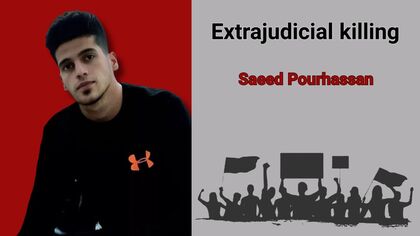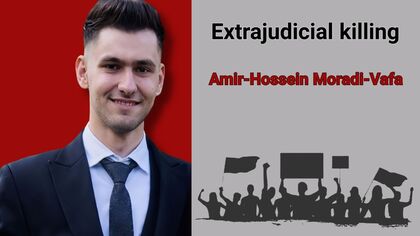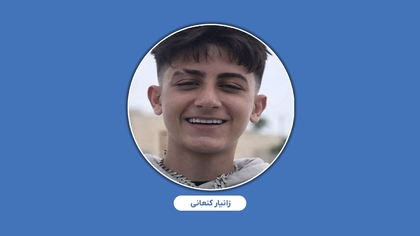Iran's Secret Executions: Findings Challenge Judiciary's False Narrative
15:33 - 8 January 2012

Kurdpa - The International Campaign for Human Rights in Iran published the first public list of 101 victims of secret group executions in Vakilabad Prison today. The Campaign called on the Iranian Parliament and judiciary to immediately institute a moratorium on executions and to move swiftly to abolish the death penalty.
“Unfortunately, many of these executions happen behind closed doors, without the involvement of lawyers or awareness of the victim’s family, and without access to a fair trial,” said Nobel Peace Prize Laureate Shirin Ebadi.
Ebadi added that Iran’s abuse of the death penalty has not been successful in fighting crime, saying:
“The Iranian judiciary and government know that the death penalty is not a suitable solution for fighting crime, particularly drug-related crimes. The basic question is this: why does the Iranian government use this type of punishment with such enthusiasm? The issue is that these executions only create fear and intimidation and serve only a political purpose. All of the statistics show that while the number of executions have increased the number of drug-related crimes have not decreased at all.”
On 21 December 2011, Ayatollah Sadegh Amoli Larijani, head of the judiciary, said “I categorically deny any secret mass executions...All executions are announced to my office...if anyone has information about executions anywhere that have been secret and without knowledge of families, let us know and we will investigate it.”
The list published today by the Campaign reveals the names of 101 individuals who have reportedly been executed without official acknowledgement, between 9 June 2010 and 20 December 2010, in Vakilabad Prison. This list, accompanied by the briefing paper Iran’s Secret Hangings: Mass Unannounced Executions in Mashhad’s Vakilabad Prison, is the first time any identities of those secretly executed at Vakilabad have been made public.
Local activists obtained this information under serious risk to their personal safety in order to lend more credence to past reports.
“This statistic, in my opinion, and the opinion of other contributors to this report, is the baseline figure,” said renowned Iranian human rights activist Asieh Amini, who contributed to this report.
“To me, the issue of executions is not a matter simply for one individual, one city, or one community. Nor is it an issue simply between the victims and their families. For us, executions is a national issue, and must be addressed widely ... When the major human rights news is about Iran’s many unjust, secret, mass executions, it is the responsibility of every Iranian to ask of the judiciary, ‘why?,’ and to try to end this national shame,” she added.
Iran is the world’s leading per-capita executor, following only China in absolute numbers. In 2011, Iran put to death over 600 individuals, at least 161 of which were in secret.
The Campaign has documented 471 secret executions in Mashhad and other cities since January 2010. The actual numbers are likely much higher. The Campaign received this information from local sources and activists with access to government data.
Executions are considered secret when they are not publicly reported by authorities and the victim’s family and lawyers have no prior knowledge that the sentence is set to be carried out.
Source: International Campaign for Human Rights in Iran
“Unfortunately, many of these executions happen behind closed doors, without the involvement of lawyers or awareness of the victim’s family, and without access to a fair trial,” said Nobel Peace Prize Laureate Shirin Ebadi.
Ebadi added that Iran’s abuse of the death penalty has not been successful in fighting crime, saying:
“The Iranian judiciary and government know that the death penalty is not a suitable solution for fighting crime, particularly drug-related crimes. The basic question is this: why does the Iranian government use this type of punishment with such enthusiasm? The issue is that these executions only create fear and intimidation and serve only a political purpose. All of the statistics show that while the number of executions have increased the number of drug-related crimes have not decreased at all.”
On 21 December 2011, Ayatollah Sadegh Amoli Larijani, head of the judiciary, said “I categorically deny any secret mass executions...All executions are announced to my office...if anyone has information about executions anywhere that have been secret and without knowledge of families, let us know and we will investigate it.”
The list published today by the Campaign reveals the names of 101 individuals who have reportedly been executed without official acknowledgement, between 9 June 2010 and 20 December 2010, in Vakilabad Prison. This list, accompanied by the briefing paper Iran’s Secret Hangings: Mass Unannounced Executions in Mashhad’s Vakilabad Prison, is the first time any identities of those secretly executed at Vakilabad have been made public.
Local activists obtained this information under serious risk to their personal safety in order to lend more credence to past reports.
“This statistic, in my opinion, and the opinion of other contributors to this report, is the baseline figure,” said renowned Iranian human rights activist Asieh Amini, who contributed to this report.
“To me, the issue of executions is not a matter simply for one individual, one city, or one community. Nor is it an issue simply between the victims and their families. For us, executions is a national issue, and must be addressed widely ... When the major human rights news is about Iran’s many unjust, secret, mass executions, it is the responsibility of every Iranian to ask of the judiciary, ‘why?,’ and to try to end this national shame,” she added.
Iran is the world’s leading per-capita executor, following only China in absolute numbers. In 2011, Iran put to death over 600 individuals, at least 161 of which were in secret.
The Campaign has documented 471 secret executions in Mashhad and other cities since January 2010. The actual numbers are likely much higher. The Campaign received this information from local sources and activists with access to government data.
Executions are considered secret when they are not publicly reported by authorities and the victim’s family and lawyers have no prior knowledge that the sentence is set to be carried out.
Source: International Campaign for Human Rights in Iran



